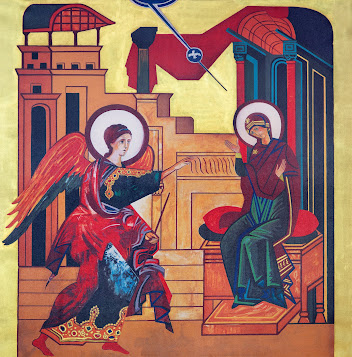Two footnotes, referring the reader to printed sources, have been omitted from this excerpt (but are retained in the original linked above). Two others have been retained but edited to fit the text. An additional intertext citation to a non-specific web source has also been omitted.
Neocatechumenal songs have a different style from traditional sacred and liturgical music. They are characterized by a sustained rhythmical quality, a preferential use for guitar and percussion instruments, and a vocal outpouring that intends to refer to the Jewish tradition and to the primitive Church.
The songs of the Neocatechumenal Way are collected in a hymnal entitled Resucitò [or He Rose from Death in English. "He Rose from Death" is also the name of one of their most popular hymns. A PDF version of the English hymnal is available from The Thoughtful Catholic.] At each presentation of new songs, training sessions are scheduled to explain their function and purpose. They have a clear biblical emphasis and are characterized by a laudatory point of view and a "kerygmatic" proclamation.
German theologian Sven Amuth notes, "Although there is a book of Neocatechumenal songs, the members of the Way do not use it in liturgical celebrations because they know them by heart, and this normally does not allow guests to be able to sing with them."
According to Kiko Argüello, for the Neocatechumenal, sacred music "has the power to awaken, to make faith ring out, something important in our age today, in which this kerygmatic aspect is very much lacking."
The Neocatechumenal Way considers the use of songs essential, both in the liturgical and extra-liturgical spheres: "The Neocatechumenal Way uses a hymnal of songs taken from the Word of God and from the Christian and Jewish liturgical tradition, which underline the contents of the different stages and passages" (Article 11 of the Neocatechumenal Way, approved by the Holy See on May 11, 2008).
We emphasize that the musical experience within the Neocatechumenal Way is quite "unique." Never, in the history of the Church, has there been the presence of a single author (the founder Kiko Argüello) for words and music that cannot be revised or corrected; this also applies to the playing style. In other words, the principle of adaptability to the cultural and social context is missing. Unlike the repertoires of other movements, the Neocatechumenal repertoire excludes performance in other contexts, because the songs are dedicated to the internal path of the Way itself. Conveniently, because being conceived for the celebrations "of" the Neocatechumenal Way, the songs would be "foreign" to other celebratory contexts.
We believe this to be limiting because it would seem to indicate an "exclusivity" which is not legitimized by the systematic Magisterium on sacred music.


No comments:
Post a Comment